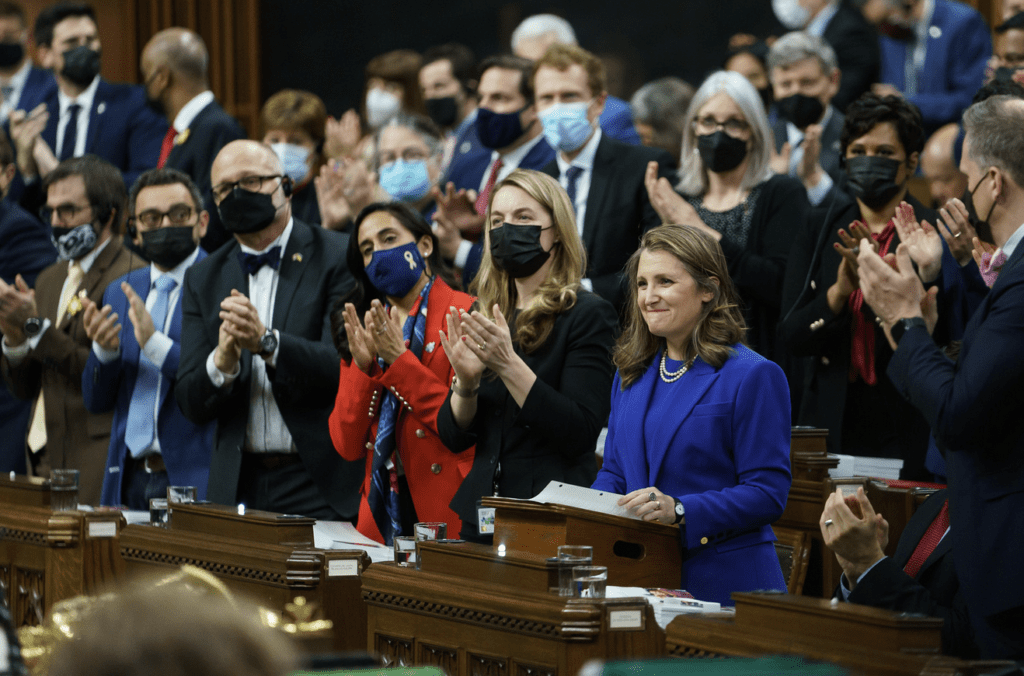A Budget for the World’s Next Chapter
 Adam Scotti
Adam Scotti
L. Ian MacDonald
April 7, 2022
When Chrystia Freeland went for the finance minister’s traditional pre-budget photo-op of purchasing a new pair of shoes Wednesday at Ottawa’s Rideau Centre, the shopkeeper asked what she was looking for. “High heels,” she replied.
At perhaps 5’3”, Freeland is accustomed to standing in heels that raise her height above podiums. But while looking for shoes that make her look taller, she doesn’t need to enhance her stature. As deputy prime minister and finance minister, she’s both chief operating officer and chief financial officer—COO and CFO—of Justin Trudeau’s Liberal government.
Freeland, a former senior financial journalist in London and New York, knows her stuff in both finance and economics at a global level. Rising in the House as markets closed Thursday afternoon, she spoke of “the pandemic debt” that “must and will be paid down.”
She continued: “This is our fiscal anchor. This is a line we shall not cross. It will ensure that our finances remain sustainable.”
Her speech was commendably brief, about 1,500 words and only 20 minutes in delivery. And she could be forgiven for a few budget boasts, about Canada having “recovered 112 percent of the jobs lost” during the hard times of the pandemic, “compared to just 90 percent in the United States. Unemployment now “down to just 5.5 percent, close to the 5.4 percent low in 2019 that was Canada’s best in five decades.” Canada, she declared, “has come roaring back.”
Not that there aren’t post-pandemic problems, notably the highest inflation in three decades, aggravated by a supply management crisis.
The costs of food, fuel and housing are off the charts. Inflation in February was 7.4 percent. Gas is now about $1.70 a litre in Ontario, or $6.50 a US gallon and $7.65 per imperial gallon. And the housing shortage isn’t just on owned homes, but equally on spiralling rent, with costs virtually doubling in the last five years.
‘Putin and his henchmen are war criminals,’ Freeland declared. ‘The world’s democracies—including our own—can be safe only once the Russian tyrant and his armies are entirely vanquished.’
And then there’s the Russian invasion of Ukraine, the country of her own family’s origins. She spoke of the February 24 invasion date in unqualified terms, as “a day of infamy.”
That would not have been written for her at Finance, or by the paper pushers at Global Affairs, who draft briefing notes about Canada being a nation of “convenors.”
Drawing on her own credentials, Freeland minced no words about Vladimir Putin, the former KGB functionary who blacklisted her in 2014, who bombs maternity wards, day cares and civilian evacuation routes, turning Russia into a pariah state.
“Putin and his henchmen are war criminals,” she declared. “The world’s democracies—including our own—can be safe only once the Russian tyrant and his armies are entirely vanquished.”
This is the sort of statement that would normally be left to the prime minister to make. But Freeland wasn’t done.
“The world’s dictators should never mistake our civility for pacifism,” she told the House. “We know that freedom does not come for free, and that peace is only guaranteed by our readiness to fight for it.”
That’s one of the enduring lessons of the post-war world and the readiness of democracies to stand and deliver, which gave birth to the NATO alliance nearly three quarters of a century ago. The West didn’t win the Cold War by caving to the former Soviet Union.
Which is somewhat contrasting to Trudeau’s prudent comments about his reluctance to expel Russian diplomats out of an understandable concern that the Kremlin would retaliate.
But in recent weeks, Trudeau has conferred a huge political gift on Freeland in terms of budget making—the three year “confidence and supply” deal with the NDP assuring the survival of the minority government until the next election in the fall of 2025.
The Lib-Dipper non-aggression pact comes at a price, of course. For starters, $5.3 billion for dental care to 2025, beginning immediately for under 12-year-olds, and next year for under 18-year-olds and seniors, limited to families with an income of less than $90,000 a year. You know, the middle class, and those working hard to join it. Some 6.5 million Canadians have no dental coverage, which doesn’t come cheap.
Not to mention a housing strategy, $10-day childcare, and another $8 billion on defence spending, expensive procurement that may finally move Canada out of its decades-long laggard status in terms of reaching the NATO goal of 2 percent of GDP allocated to defence spending.
NDP Leader Jagmeet Singh can say he has delivered for progressives as no leader on the left has since the alliance of the party’s revered founding leader, Tommy Douglas, with another Liberal PM, Lester Pearson, in the minority government era of 1963-68 that produced universal health care, the Canada-Quebec pension plans and the Canadian flag.
As for Trudeau, he gets to govern in peace until 2025, when he can make a decision to either move on in life after a decade in office, or seek a fourth term, as only his father has won since the Second World War.
And if the Liberal leadership should open up, there’s Chrystia Freeland.
L. Ian MacDonald is editor of Policy Magazine.
